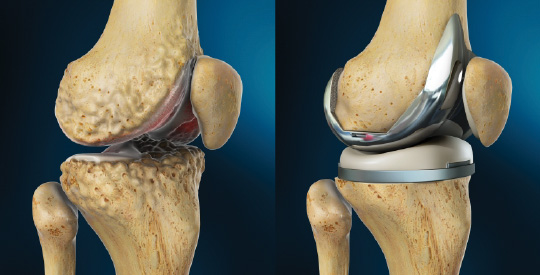Are you at risk of rheumatoid arthritis? Know your risk.
Dr. Sharad Jain
This article is about Rheumatoid arthritis. Know whether you are at risk of rheumatoid arthritis.
Read MoreTotal knee replacement surgery involves removing damaged parts of the knee joint and replacing them with artificial implants. The surgery is performed under general anaesthesia and typically takes around two hours..
During the procedure, the surgeon makes an incision in the front of the knee and removes the damaged cartilage and bone from the joint. The surgeon then replaces these parts with metal and plastic components that mimic the natural shape and function of the knee joint.
After the implants are placed, the surgeon closes the incision with stitches or staples and bandages the knee. The patient is then taken to a recovery room to wake up from the anaesthesia.

Total knee replacement surgery is typically recommended for patients with severe knee pain and disability that affects their daily activities and quality of life. The most common reasons for the procedure
include:
1. Osteoarthritis - This is the most common cause of knee pain and disability and occurs when the cartilage that cushions the knee joint wears down over time.
This can cause pain, stiffness, and limited range of motion in the knee.
2. Rheumatoid Arthritis - This is an autoimmune disorder that can cause inflammation and damage to the knee joint, leading to pain and stiffness.
3. Injury - The frozen stage can last several months to a year or more. During this stage, the pain may subside somewhat, but the shoulder remains stiff and movement
is limited.
Before the surgery, the patient will undergo a physical examination and medical tests to ensure they are healthy enough for the procedure.
The surgeon will also discuss the risks and benefits of the surgery and answer any questions the patient may have.
After the surgery, the patient will stay in the hospital for a few days to monitor their progress and begin rehabilitation. Physical therapy is an essential part of
recovery after total knee replacement surgery and typically begins the day after the surgery.
Physical therapy focuses on helping the patient regain range of motion in the knee, build strength in the leg muscles, and learn how to walk with the new joint.
The patient will work with a physical therapist both in the hospital and after they are discharged to ensure a successful recovery.
The primary benefit of total knee replacement surgery is the relief of knee pain and restoration of mobility. The procedure can improve a patient's quality of life by
allowing them to participate in activities they were unable to do before the surgery, such as walking, climbing stairs, and participating in sports.
In addition to pain relief and improved mobility, total knee replacement surgery can also help prevent further damage to the knee joint and delay the need for
additional surgeries
As with any surgery, there are risks associated with total knee replacement surgery. These include:
1. Infection - There is a risk of infection at the site of the surgery, which can be treated with antibiotics.
2. Blood Clots - Blood clots can form in the legs after surgery, which can be prevented with blood-thinning medication and early mobilization.
3. Implant Failure - In rare cases, the artificial implants can loosen or wear out over time, requiring additional surgery to replace them.
It is crucial to seek medical advice if you are encountering continuous knee pain that is impacting your daily routine. Furthermore, if you experience signs like
inflammation, warmth, or swelling around the knee joint, fever or chills, sudden severe pain in the knee joint, numbness or tingling sensations in the leg or foot,
or difficulties supporting weight on the affected leg, it is essential to contact your doctor right away. Early medical intervention can help to prevent further harm
and optimize the success of total knee replacement surgery.
Total knee replacement surgery is a common procedure used to treat severe knee pain and disability caused by osteoarthritis, rheumatoid arthritis, or injury.
We write the blogs time to time to guide website visitors about Symptoms, Causes and Treatments

Dr. Sharad Jain
This article is about Rheumatoid arthritis. Know whether you are at risk of rheumatoid arthritis.
Read More
Dr. Sharad Jain
A large number of people are effected by arthritis in Meerut. Read the article for details.
Read More